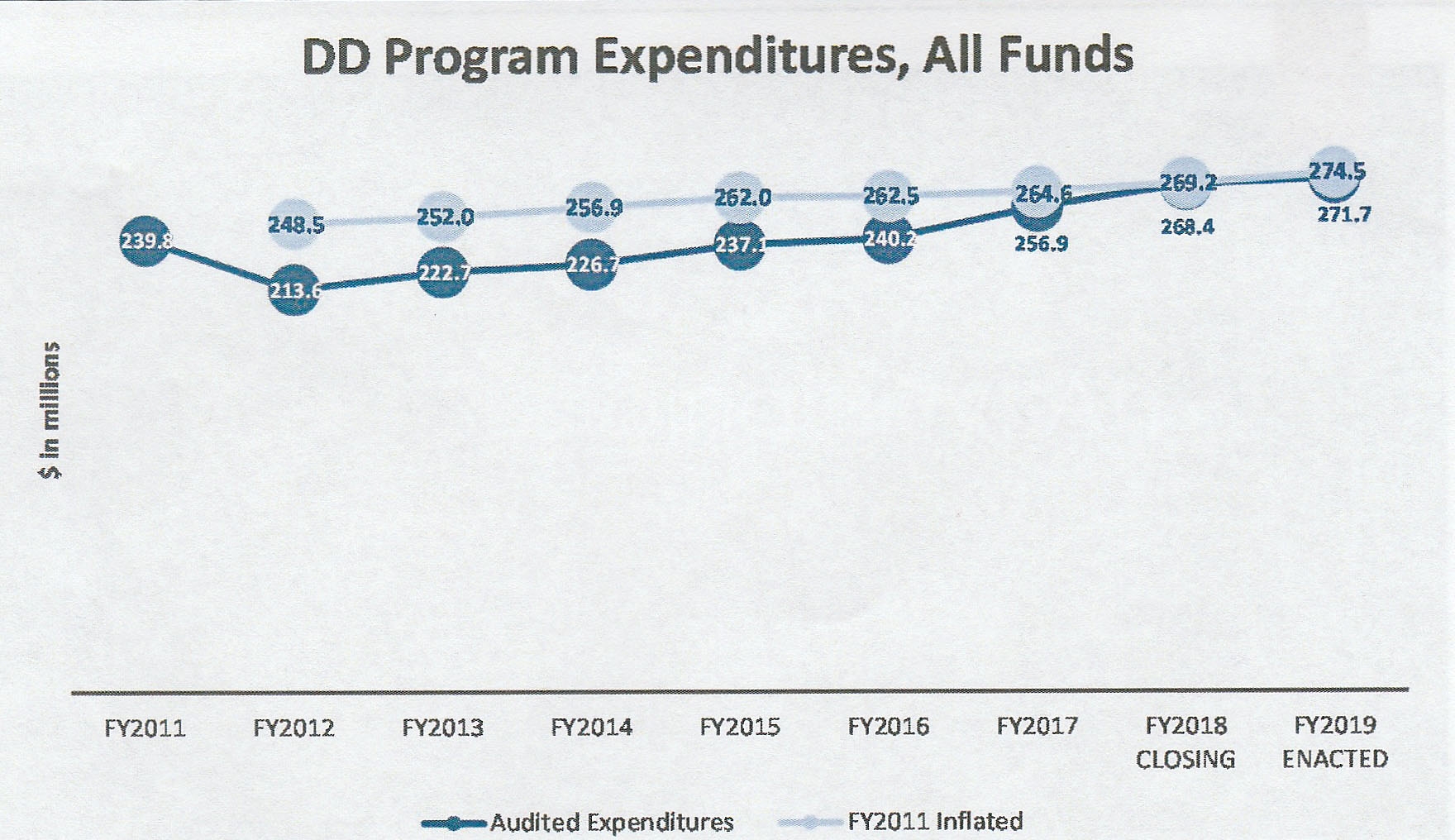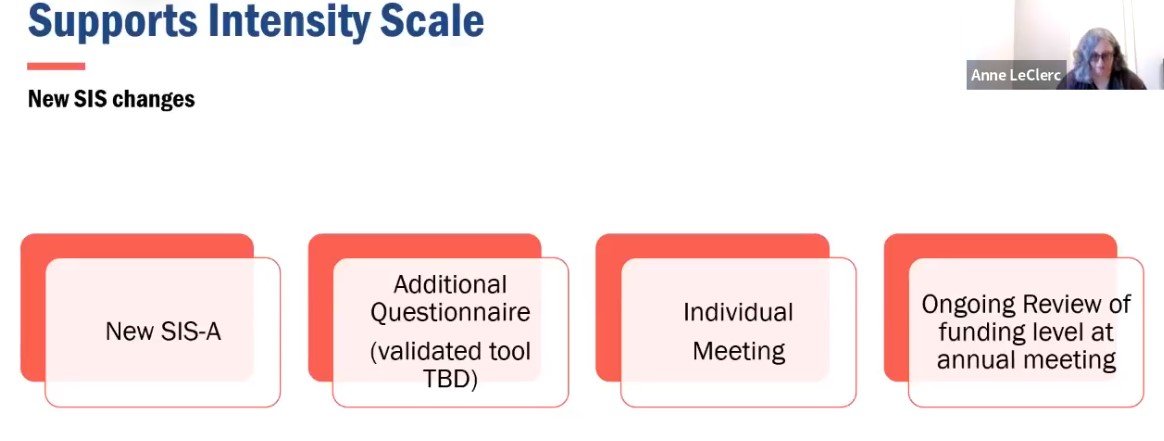RI Plans For Emergency Funding To Shore Up DD Providers After Community Calls For Help
/By Gina Macris
Rhode Island Governor Gina Raimondo announced March 26 that the state will soon release a total of $15.4 million in state and federal Medicaid “retainer payments” to shore up private service providers facing unprecedented challenges in the coronavirus pandemic.
The announcement came hours after representatives of private service providers and a prominent advocacy group expressed anxiety about a heightened vulnerability of people with developmental disabilities to the disease and called on the governor to do more.
The retainer payments “are seen as essential to supporting our critical DD (developmental disability) partners, many of which had to cease services due to COVID 19,” a spokesman for the state Department of Behavioral Healthcare, Developmental Disabilities and Hospitals (BHDDH) said late in the afternoon.
BHDDH and the state’s Medicaid system, managed by the Executive Office of Health and Human Services, are working to make the funds available “as soon as possible,” the spokesman said. He said the retainer payments have been approved for a three-month period, with the first checks going out as early as next week.
Several hours before the announcement, spokesmen for the Community Provider Network of Rhode Island (CPNRI) and the Developmental Disabilities Council of Rhode Island issued a statement detailing the vulnerabilities of individuals with developmental disabilities and those who live and work with them.
“We need to act now to address the needs of our community, which we have identified repeatedly to the administration,” said Michael Andrade, President of CPNRI, a trade association of 24 private agencies licensed by the state to provide support and care for adults with developmental disabilities – including those in group homes.
Andrade said state testing priorities and emergency planning must include group homes and people in shared living, an arrangement in which adults with developmental disabilities live in private apartments or single-family houses with a host family.
Kevin Nerney, executive director of the Developmental Disabilities Council, agreed that testing, protective equipment, and other emergency measures “must be a priority” for vulnerable individuals and their caregivers.
“There is an obvious concern about spreading the virus by those receiving services and those who provide those services,” Nerney said.
“As people become sick, they may still require in-person services. We want to make sure it is possible to continue services when necessary, even for the sick,” Nerney said.
Those who care for people with developmental challenges must be considered “the essential health care workers that they are” and must be compensated appropriately during the crisis, Nerney said.
The BHDDH spokesman said later in the day that the administration has taken steps toward a declaration that those who work with persons with disabilities are “essential health care workers” necessary in the state’s emergency response to the virus.
The spokesman, Randal Edgar, said state human services officials have “escalated” the needs of developmental disability service providers for Personal Protective Equipment (PPE) to the Rhode Island Emergency Management Agency and are trying to expand the availability of interpreter services. Some direct care workers who provided daytime services have been re-assigned to residential programs, Edgar said.
About 4,000 Rhode Islanders with developmental disabilities receive services funded by BHDDH, including 1180 who live in group homes. Many adults with developmental disabilities face challenges in practicing good hygiene and social distancing and have underlying medical conditions that put their immune systems at greater risk than the average population.
Edgar said the governor, BHDDH and EOHHS “are committed to meeting the needs of the state’s most vulnerable residents. This pandemic is challenging our State and all Rhode Islanders, and we recognize that there is significant impact on individuals with disabilities, their families, and the direct care workforce who support them. We are working tirelessly to ensure that resources are in place to support residents with developmental disabilities as well as the providers who care for this population.”
In a televised afternoon briefing March 26, Raimondo said her goal is to develop the capacity to test 1,000 people a day in a week’s time, a pre-requisite in defining the spread of the coronavirus and informing the state’s efforts to contain it.
Rhode Island has about 5,000 workers in the developmental disabilities field, not counting family members who also provide care and support, according to CPNRI and Nerney.
Tina Spears, executive director of CPNRI, said in an email that providers are “extremely nervous” about infection among those in their care and about their ability and readiness to respond to such a scenario.
“We are deeply troubled by the lack of emergency planning,” she said in the email, sent early in the afternoon.
Providers are taking emergency measures independent of state government, but they need more support and resources, she said.
“We are equally concerned for family caregivers at home,” said. “If and when they become ill, we must be able to step in and support the family,” Spears said.
Most of the 4000 authorized to receive services from the state Department of Behavioral Healthcare, Developmental Disabilities and Hospitals (BHDDH) live at home and receive daytime services from a private agency.
Of the total BHDDH caseload, about 700 individuals living at home also have service programs directed independently by their families. These families need flexibility to hire additional staff – including other family members – in an emergency, Nerney said in a separate letter to Raimondo that was signed by the leaders of several organizations serving the developmental disabilities population.
Spears, meanwhile, said that with daytime programs closed, agencies are unable to provide services to participants living in family homes on a broad scale because of a lack of authorization from the state.
She said providers were given the authorization to provide “tele-health” services, but “this is not helpful in most situations for the people we support.”
Some providers have reluctantly laid off staff, because they cannot afford to keep them, Spears said. The state’s fee-for-service system reimburses private agencies only after services are provided, usually in ratios of one worker to several clients. One-to-one services are more costly, and no adjustments have been made to authorize them on a broad scale, Spears said.
“We would prefer to be overstaffed at this point and be able to provide more support in the community. This has been our consistent goal,” Spears said.
After the BHDDH announcement, Spears said in a telephone interview that she was “heartened” by the news of the retainer payments but is awaiting additional detail. Spears said she hopes the payments cover pay increases for “our vital workers.”
Spears, Andrade, Nerney and others had asked Raimondo for emergency funding to help caregivers and providers weather the crisis. The privately-run system of services was already in precarious financial health before the crisis, according to consultants for BHDDH.
Nerney has urged Raimondo to follow the lead of the state of Connecticut, which continues to pay private service providers, raising rates.
As part of Connecticut’s emergency preparedness response, the state’s Department of Developmental Services has increased allocations to group home operators by 25 percent and has increased payments to providers of daytime programs by 5 percent, with the proviso that providers will not lay off workers.
The Connecticut advisory to developmental disability service providers was attached to a letter from Nerney to Raimondo dated March 23. It raised many of the same concerns as the CPNRI statement and and aired specific questions from families seeking guidance about details of the care of family members at home who have developmental disabilities.
In addition to Nerney, the letter was signed by Amy Grattan, Executive Director of the Sherlock Center on Disabilities; Deanne Gagne, Coordinator of the Cross Disability Coalition; Sam Salganik, Executive Director of the Rhode Island Parent Information Network; Deb Kney, Executive Director of Advocates in Action; Joanna Scocchi, Executive Director of the ARC Rhode Island Family Advocacy; and Ken Renaud, Coordinator of RI FORCE, a family advocacy group.















